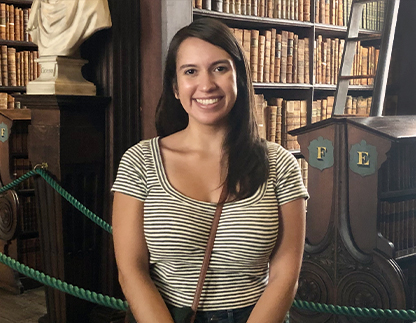It is such a privilege to use my knowledge to help people and to listen to stories from the community directly impacted by my research.”
Miranda Munoz
Postdoctoral Scholar in the Department of Physical Therapy and Human Movement Sciences

Miranda Munoz is a postdoctoral scholar in the Department of Physical Therapy and Human Movement Sciences in the Feinberg School of Medicine. She also serves as the treasurer for the Northwestern University Postdoctoral Association (NUPA). Miranda’s research utilizes eye-tracking to assess motor and cognitive control following pharmacological and surgical treatment in people with Parkinson's disease. She is passionate about using science communication to bridge the gap between technical research and the general public.
How would you describe your research and/or work to a non-academic audience?
My research focuses on examining the impact of Parkinson’s disease treatments—medication, surgery, and exercise—on both motor and cognitive control. To achieve this, I track people’s eye movements because this is a useful, non-invasive tool to understand changes in the brain. My goal is to understand how these treatments affect a range of motor and cognitive behaviors to improve treatment outcomes and minimize side effects.
What do you find both rewarding and challenging about your research and/or work?
One of the most rewarding and challenging aspects of my work is engaging with people with Parkinson’s disease or their loved ones when they ask for advice. As an early career researcher, it can be hard to always see myself as an expert even though others perceive me that way. I strive to be absolutely accurate while effectively translating science to non-scientists in a way that’s both meaningful and compassionate. But ultimately, it is such a privilege to use my knowledge to help people and to listen to stories from the community directly impacted by my research.
Why Northwestern?
I came to Northwestern because of the exciting and innovative human rehabilitation research in my department, Physical Therapy and Human Movement Sciences, and at the Shirley Ryan AbilityLab. The unbeatable location of downtown Chicago was also a huge draw. When I accepted my offer into the Northwestern University Interdepartmental Neuroscience (NUIN) Program for my PhD, I knew it was a possibility that I wouldn’t want to leave Northwestern, and it turns out I was right. Therefore, I was more than happy to continue my academic journey at Northwestern for my postdoctoral fellowship!
How do you unwind after a long day?
I love going to the movie theater with my partner and friends, and luckily downtown Chicago has many options. I’ll watch anything from the new blockbuster at AMC to a foreign indie showing at the Gene Siskel Film Center. Movies are a great way to learn more about the world while letting your own daily stresses wash away.
What books are on your bedside table?
My go-to comfort genre is fantasy and I recently finished Babel by R.F. Kuang and The Fragile Threads of Power by V.E. Schwab, which were both immersive and wonderful. Currently, I’m reading the new essay collection, Opinions by Roxane Gay, who I had the pleasure of hearing speak when she came to Northwestern during the first year of my PhD.
What are you most proud of in your career to date?
I am most proud of finishing my PhD in May! I am proud of what I accomplished in those years despite several obstacles and challenges, while still retaining a passion and excitement for research. Graduating with my PhD was especially important to me as a first-generation college student. Arriving at college without any knowledge about academia, I really had to create my own roadmap to achieve my goals.
Publish Date: January 23, 2024
If you know a graduate student, postdoctoral scholar, graduate faculty member, staff member, or a member of our TGS alumni population who would make a great candidate for our TGS Spotlight Series, please complete this brief TGS Spotlight Series Nomination Form.